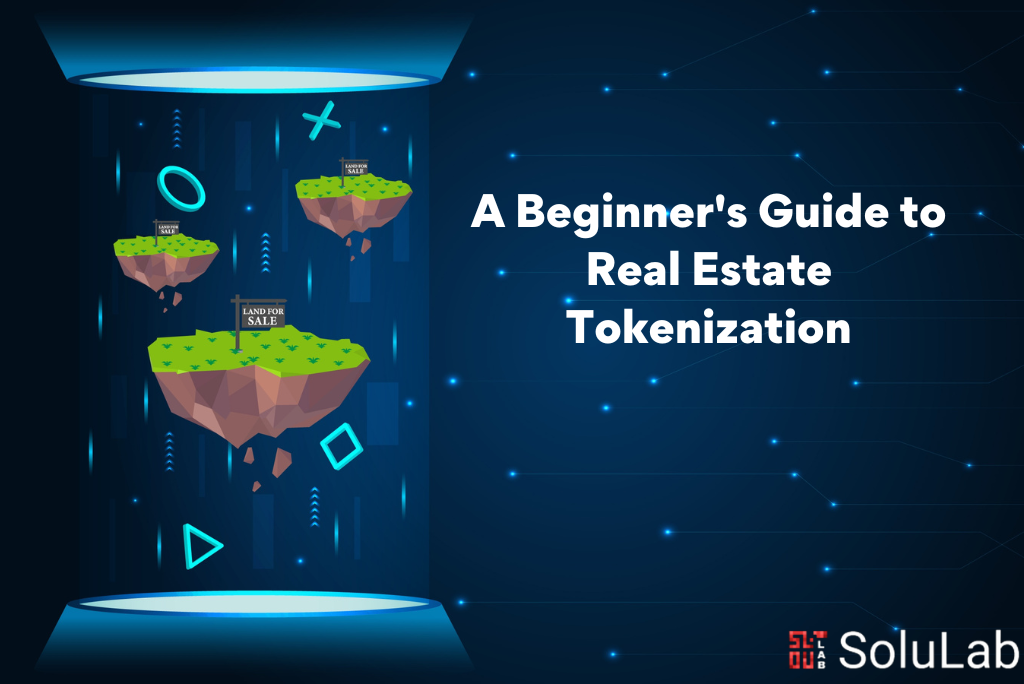
The adoption of blockchain technology in real estate has led to a radical transformation of the industry. It has made it easier for people to own digital real estate, allowing people who were previously excluded due to a lack of resources to participate and hiding problems such as a lack of transparency and trust.
Real estate has historically been a very illiquid asset, requiring substantial financial investments and drawn-out transaction procedures. However, tokenization has changed the situation. Additionally, the blockchain technology that underpins it has enabled previously unheard-of transparency. Having stated that buyers can now complete transactions utilizing tokenized real estate in an immutable manner.
This article debunks real estate tokenization development & answers concerns about the question of what is the tokenization of real estate, the practical operation of real estate tokens, tokenized ownership, and the amount of real estate that has been tokenized. Let’s first examine how real estate has changed as a result of its fractionalization and subsequent tokenization as we go through this guide to real estate tokenization.
Tokenization of real estate
Real estate is referred to as being tokenized when a piece of property is broken up into digital tokens that represent the underlying value of the asset with all of its rights and liabilities. Contractual details are defined via smart contracts. If a predetermined contract condition is met, the algorithm stored in the digital contract initiates the actions described in the code.
For example, a smart contract can operate without the involvement of a human to effectuate a transfer within a land register. It verifies the operations and automatically creates a new block, adding it to the blockchain.
ERC-721 tokens are applied to fractionalize NFTs. On the Ethereum (ETH) blockchain, ERC-721 denotes a predetermined standard and is linked to a smart contract that records the transactions where these tokens are involved. The traceability, as well as security of the transaction, are to be improved by the ERC-721 standard.
How does real estate tokenization work?
Real estate is fractionalized into tokens and maintained on a decentralized database through the process of real estate tokenization development. The term “blockchain” refers to this decentralized database, which functions as a kind of electronic ledger for information storage. NFTs and real estate tokens are comparable. A real estate token might stand for any of the following:
- ownership of a portion of real estate
- ownership of the whole piece of real estate
- an ownership stake in a company that manages real estate
- a stake in a loan with real estate as security
- a claim to a portion of the earnings derived from real estate
Real estate tokens differ from Real estate investment trusts (REITs) in that tokens allow a specific investment to link a specific real property, as opposed to REITs which typically support investment into pools of varied real estate assets. In a security token offering, the digital tokens are produced and distributed on a blockchain (STO). To award ownership, each ownership portion is transformed into a token and then encrypted.
Read also: How to Buy Real Estate Using Cryptocurrency?
The sale of Aspen Coins, one of the first profitable commercial real estate STOs raised almost US$18 million in 2018. These digital tokens represented fractional ownership of the opulent St. Regis Aspen Resort in Colorado, USA.
There are numerous such instances, like a project in the United States that aims to fund $100 million by issuing 100 million tokens at $1 each for a 24-story, 374-unit multifamily residential building in downtown San Jose that is being constructed by Alterra Worldwide.
Benefits of real estate tokenization
-
Lower barrier to entry
Real estate tokenization facilitates small-scale investor engagement and decreases entry barriers for retail investors by permitting investing in fractional pieces of real estate.
-
Ability to create liquidity
Blockchain technology makes it simple and safe to transfer real estate tokens, enabling investors to diversify their portfolios, lower risk, and increase liquidity in the real estate market.
-
Lower transactional costs
Blockchain technology offers the ability to simplify investment transactions and reduce transaction costs through automated procedures and a permanent, unchangeable digital record.
-
More transparent and efficient transactions
Blockchain transactions are transparent and irreversible because of the decentralized nature of blockchains, which makes them perfect for the real estate industry with its many parties and intricate processes. Smart contracts that are automatically generated do not include any humans in the transaction process, which makes unfair trades impossible. There is no paperwork or waiting period for transaction completion in a blockchain-based system. Quick decisions and transactions are the outcomes of this. When using blockchain for real estate transactions, there are no set office hours like there are in traditional banking. Instead, the system operates transparently and continuously.
-
Opportunity for small-scale investors
Real estate is typically regarded as an exclusive class of investment. However, tokenization has made real estate investment possible for smaller investors as well. If investors don’t have vast funds, the excessive cost of real estate assets sometimes discourages them from participating. But things have changed since real estate is now available to small-scale and individual investors thanks to the tokenization of the industry. Tokenization breaks up enormous assets into smaller fractions, making them more inexpensive and available to individuals who are interested.
-
A free-flowing market
Overly regulated and frequently prejudiced centralized banking systems are harmful to market freedom. The real estate industry now has access to a decentralized, bias-free financial system thanks to blockchain-based tokenization. Each stakeholder has some degree of control over the outcome, and they decide as a group. A market that is streamlined and offers all players an equal chance to flourish results from the removal of unjustified barriers.
-
Decrease in counterparty risk
It is difficult to track longer transaction chains. The pre-tokenized real estate age presented a dilemma since third parties complicated and distorted the situation. Things are improved from a regulatory standpoint by smart contracts, a crucial component of blockchain-based transactions. The chain of transactions is kept short and free of hazards brought on by weak links with minimal human involvement. Because of this, there is a greatly diminished, if not entirely gone, danger of counterparty participation.
Limitations of Real Estate Tokenization
-
Smart contract security loopholes
The blockchain network is well secure. But in smart contracts, you can find loopholes that need to be fixed. Hackers are always trying to sneak into the code and steal money from smart contracts. If the smart contract has been diligently audited, the money isn’t secure. A simple hack or a system glitch could rob the assets of real estate investors. In the worst case, once these assets are lost, their recovery is impossible.
-
Complex licensing requirements
The tokenization of real estate assets needs licensed platforms for the operations and management of STOs (security token offerings) to be regulated. The process of achieving a license is a bit complex. Even before the licensing stage, you need to go through multiple phases of trial and error and recurrent tests so they can be successful.
-
Regulatory issues
Many people who are working in regulatory authorities and real estate employees have no idea how blockchain technology works and eliminates the issues the sector is facing. These things lead to a poor regulatory environment and generate hurdles for all stakeholders. Regulatory uncertainty dampens the investors’ trust, resulting in poor growth.
-
Tax complexities
Many Tax regimes haven’t clear cryptocurrency tax legislation, which is an issue for stakeholders. Despite the fact that the benefits of tokenization are acknowledged on a worldwide scale, a sound taxation system has not been implemented. Everyone concerned has doubts because there isn’t a single tax system in place.
Some points to be considered!
-
Securities law implications
Generally, the tokenization of real estate will be considered security but an analysis of each specific token should be considered at the outset. If the token is a security, the issuance of such a token will be subject to the applicable prospectus requirements or reliance on an exemption, such as the “accredited investor” exemption. In addition to the prospectus requirements, the issuer must consider the applicable registration requirements.
-
Reconciliation with the land registries
Real estate tokenization requires reconciling the applicable transaction with the current systems of land registration. Each jurisdiction of Canada has its land registration system, and an issuer of a real estate token will be required to reconcile the transaction with the land registration systems of the jurisdictions where the underlying real estate is located.
Top 5 Real Estate Tokenization Companies
Blockchain App Factory
One of the first businesses to tokenize real estate as more than just a qualified Web3 service was Blockchain App Factory. The company is among the top tokenization platforms in real estate across both the physical world and virtual worlds. The business is present throughout the world, it should be noted. Since the company’s professionals are familiar with the real estate tokenization factors, they make sure that all necessary procedures are followed before distributing client project tokens. The business is a wonderful fit for any startup hoping to succeed in the Web3 real estate sector because it has expertise in consultation, legal matters, programming, testing, and promotions.
Appwrk
A Web3 company called Appwrk is engaged in the tokenization of real estate among other real estate token platforms. The company has established a professional strategy for its real estate asset digitization projects that guarantee the project turns out as planned for clients. The business offers its skills in transaction structure, digitization, technology, distribution, and marketing, as well as post-launch assistance to tokenize real estate. If desired, one might even acquire a platform like a token marketplace in addition to tokens. The company’s blockchain developers have completed a number of noteworthy projects on Web3 real estate, and as a result, they have established a solid name in the rapidly increasing Web3 community.
SolidBlock
SolidBlock is a unique company that mostly operates in Israel and provides real estate tokenization development services. It describes itself as a company that offers tokenization as a service. The company helps entrepreneurs turn their real estate into blockchain-based tokens and makes it possible for them to raise money using those tokens. SolidBlock has quickly expanded in a specialized industry thanks to the ideal group of luminaries in development, analysis, legal issues, marketing, and leadership. These services are offered in an admirable manner. For asset fractionalization & security token offering campaigns, the company excels in producing real estate tokens.
Somish
For startup enthusiasts looking to tokenize real estate assets, Somish has been another option. Young people with extensive experience working with Web3 apps make up the organization. Commercial, residential, & trophy real estate tokenizations are the company’s areas of expertise. Additionally, it provides partner networking services, compliance insurance, Web3 real estate advice, and security token offering (STO) services. Additionally, Somish has received other honors, such as hackathon victories, ongoing open-source programming partnerships, as well as technological contributions to the Web3 community.
Blockchain Firm
Blockchain Firm, a seasoned player in the Web3 market, provides excellent real estate tokenization development services. The business offers a wide range of services on the domain, such as the creation of platforms for real estate listings, hybrid tokenization, fractional tokenization, crowdfunding, leasing and rental assistance, and loan & mortgage facilitation. For Web3 real estate, teams at the Blockchain Firm also work on planning, smart contracts, NFT development, website development, platform development, & marketing services. The company has offices across a few nations, a substantial global presence, and extensive expertise working on certain well-known Web3 projects.
Tokenization’s role in the future
Tokenization offers a practical and affordable way to invest in real estate assets, but because it is a relatively new venture, regulators have not yet established a clear set of regulations. Which regulatory frameworks will be used depends on the type of asset being tokenized.
Real estate tokenization has the potential to revolutionize real estate investment by increasing liquidity in a predominately illiquid asset class, lowering entry barriers for retail investors, and lowering transaction costs. However, market participants currently face challenges related to clear market regulation, reconciliation with land title registries, and the requirement for centralized reporting of transactions.
Read also: What is the Future of Crypto Real Estate?
Real estate professionals, including those in the legal, financial, and real estate fields, should be consulted if investors or owners of real property are interested in profiting from the trend of real estate tokenization.
Conclusion
As the guide to real estate tokenization is coming to an end, A decentralized, bias-free financial system has been brought to the real estate sector thanks to the blockchain as the guide to real estate tokenization is coming to an end-based tokenization. Liquidity increases during tokenization as real estate is fractionalized. People sell tokens rather than the entire property at once, which causes a fast shift of ownership. Tokenization is bringing about some truly amazing changes to the real estate sector. A wider variety of participants and developers are drawn to the process of participating in or investing in real estate.




